DAObi White Paper
Questions, comments, restraining orders etc. to be addressed to @DaobiTreasury or @XianyangCB on Twitter.
Goals
DAObi is a blockchain-based simulation of an ancient Chinese state. Players compete for political and economic power, and the player who builds the biggest faction becomes Chancellor, winning the right to set the token minting rate for as long as their support lasts. Whoever wishes to take power must use analogue means - charisma, bribery and intimidation – to persuade other players to back their faction.
The primary aim of the DAObi project is not to make money – though any tokens eventually issued must accumulate sufficient value to incentivise serious participation – rather it is to function as a game and a social experiment. The project was inspired by descriptions of factional struggles over the right to set monetary policy during the early part of the Han dynasty (“daobi” being the name of the currency in use at the time). We intend to recreate these conditions as closely as possible in an online environment. In other words, the DAObi ecosystem will become a palace intrigue game in the style of Royal Chaos or Call Me Emperor, but with genuine money and power at stake.
In the past, experiments such as this were impossible for all but state governments. The development of blockchain-based currencies means that anyone can now create and run a semi-autonomous political-economic system from their PC. While the primary use of this facility has thus far been in financial speculation, the same technology also provides a means to test socio-economic models in vivo. The data can then be used to verify existing models and create new ones. This is the major goal of the DAObi project.
Method
In the DAObi ecosystem, minting stands in for the levers of conventional monetary policy. Whichever participant has the most declared partisans is granted the right to set the token generation rate. To acquire partisans, a participant must use analogue techniques to convince them to declare themselves in his favour: persuasion, corruption, deception etc.
We thus propose a system comprising three principal components:
1. The DAObi cryptocurrency itself ($DB): a generic online token designed to be as simple as possible to acquire and exchange in order to encourage participation. The token contract is currently live on the Polygon network (0x5988Bf243ADf1b42a2Ec2e9452D144A90b1FD9A9), with the tokens being tradable on Uniswap.
2. The faction table: player affiliations are declared and stored on-chain (contract address: 0xe8A858B29311652F7e2170118FbEaD34d097e88A). Owners of DAObi are not under any obligation to participate in this component, but registration will be necessary for all those who wish to have a chance to win the right to set the token generation rate themselves or decide who will. In order to register, they must have a wallet containing a non-zero quantity of DAObi linked to a valid Twitter account. Once these conditions have been fulfilled they receive an NFT that gives them the right to become a partisan of another user or accumulate partisans of their own (or both) via the daobi.org front end. When a participant follows or abandons another participant, this information is recorded on the public ledger, which then plays the role of the emperor, making whichever participant has most partisans his “chancellor” and granting him the right to set monetary policy. Faction counting is done on a rolling basis: once a player is a member of a faction, they remain in that faction until they choose to leave.
- The Chancellor's seal: the holder of this NFT (contract: 0xE024B49eF502392E0eE64EC0323FF6aE7b463623) has the right to both claim a $DB 1000 daily salary, as well as to set the Daobi token minting rate.
Design
In the initial stages of the project, the voting and token-generation systems were simulated via a Discord server linked to an Airtable record of votes, Chancellors and tokens generated. (Note that for ease of use in a Discord context, votes are held on a daily rather than a rolling basis.) A token contract was then developed and deployed to the Rinkeby Ethereum testnet (0xD79dA24D607FF594233F02126771dD35938F922b), and a Uniswap DAObi-pool was created to enable holders to buy, trade and stake tokens (https://app.uniswap.org/#/pool/13306?chain=rinkeby). This enabled us to create working models of the automations and the blockchain components of the project without going straight to production, as well as to anticipate the economic phenomena we would likely encounter.
Finally, once the concept had been thoroughly tested, a production version was rolled out on the Polygon network. Network activity can be tracked on the block explorer using the contract addresses:
- Token contract: 0x5988Bf243ADf1b42a2Ec2e9452D144A90b1FD9A9\
- Faction contract: 0xe8A858B29311652F7e2170118FbEaD34d097e88A\
- Chancellor's seal contract: 0xE024B49eF502392E0eE64EC0323FF6aE7b463623
The current contract uses a UUPS upgrade protocol, since the team would like to replace the current RPC provider (Infura) with an independent Polygon node at some point.
Users give proof-of-human using Twitter:
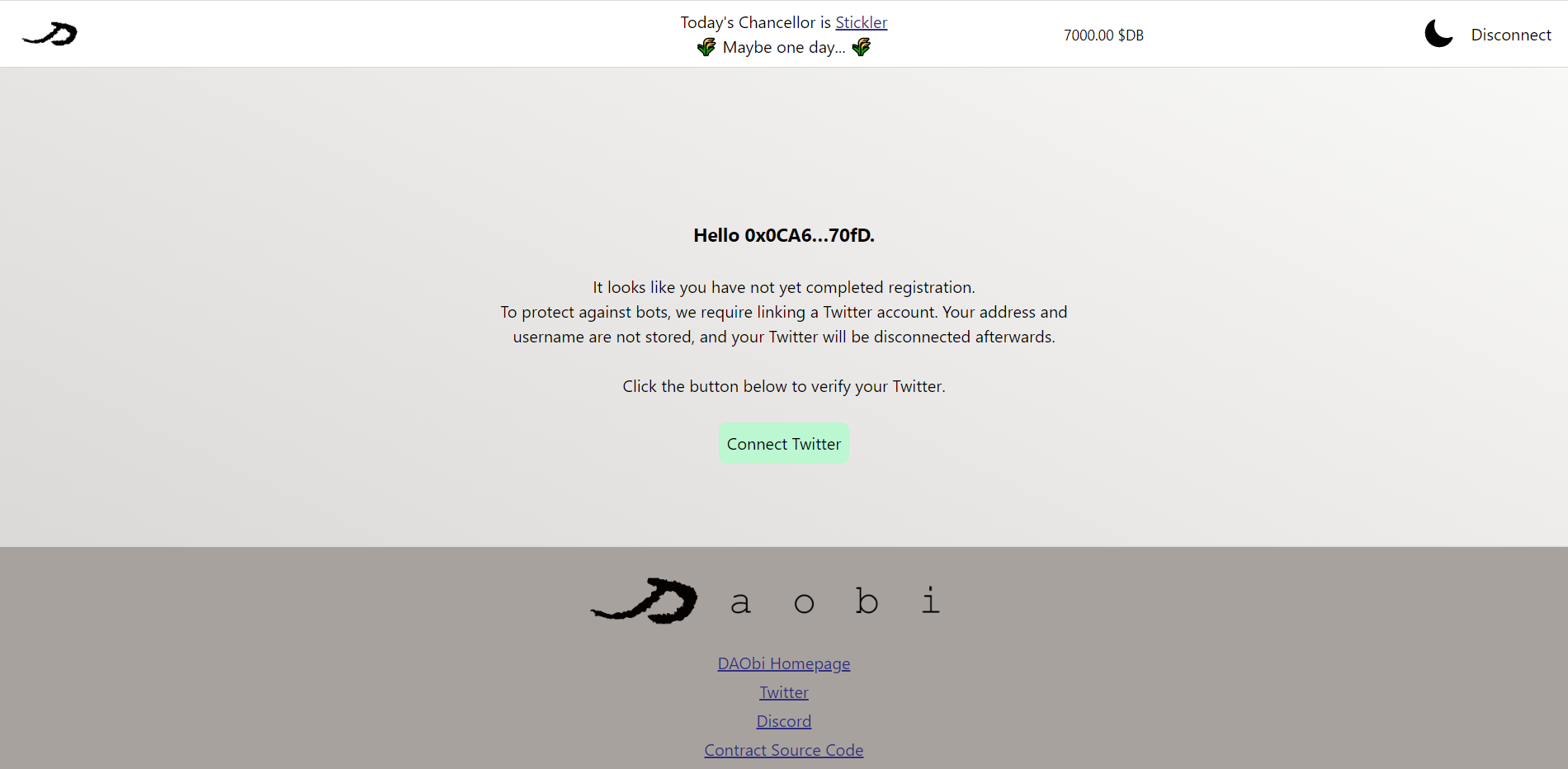
They then sign in using Metamask, with the second requirement for signing in being that their wallet must contain at least some DAObi.
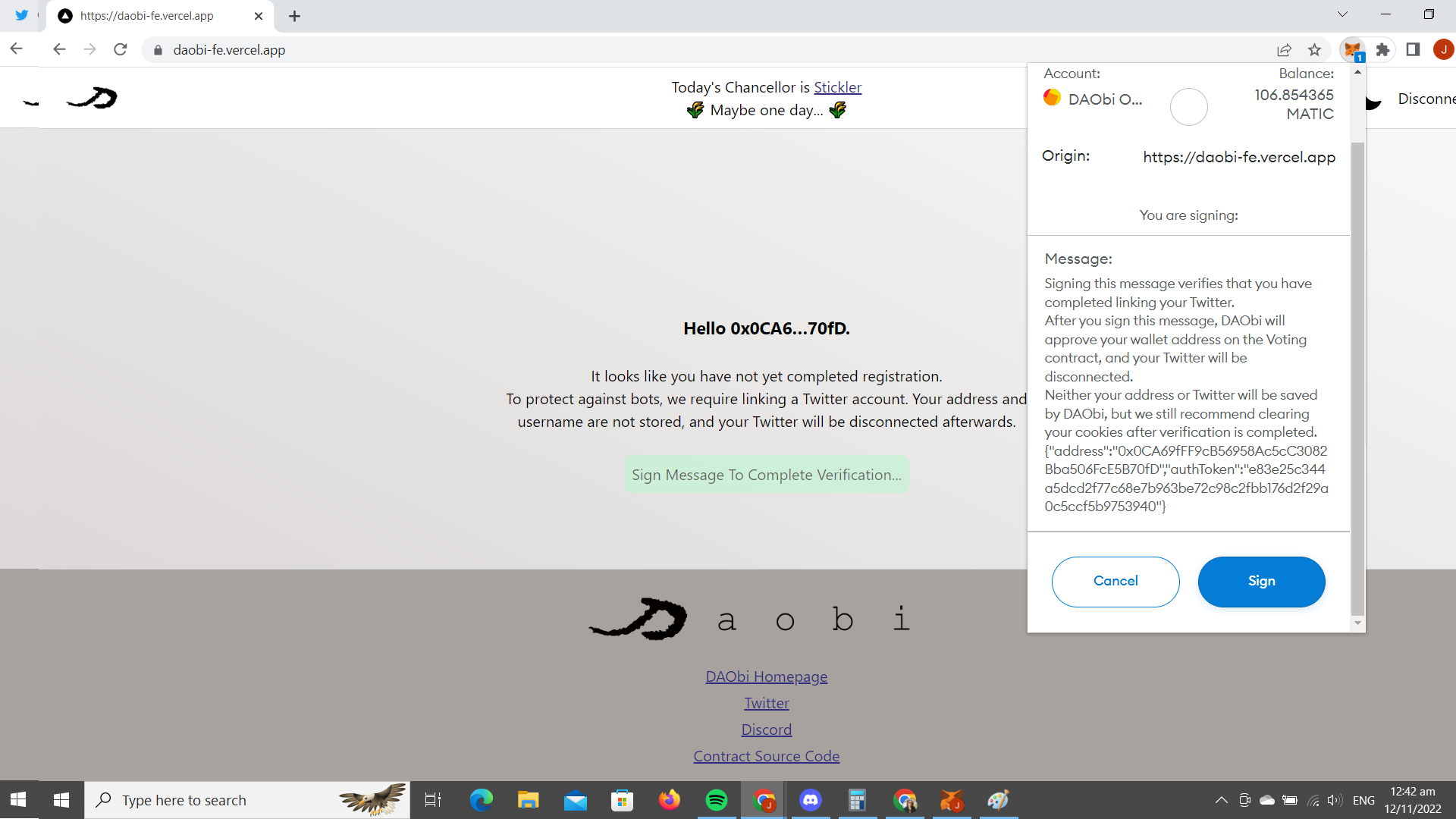
This being done, they will receive a voting token that will allow them to interact with the site. (Only one voting token can be held by any given wallet.)

They can select the person they wish to follow and choose a user name.

Once in the system, they can choose to join another faction or interrogate the block explorer via the site, checking up on competing factions:
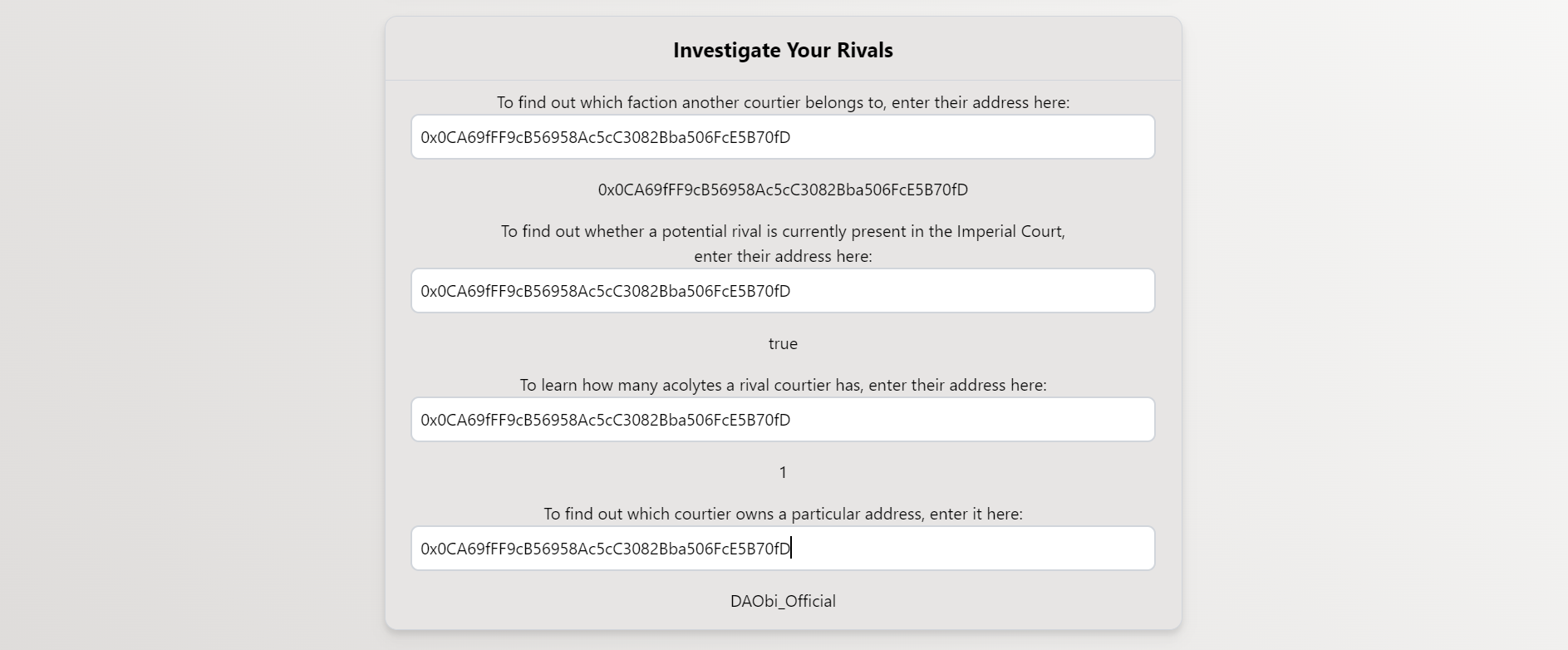
They can also choose to leave the system, whether temporarily by leaving their current faction or more definitively by burning their voting token. (If they wish to rejoin, they will have to reconnect their wallet and mint a new voting token.)
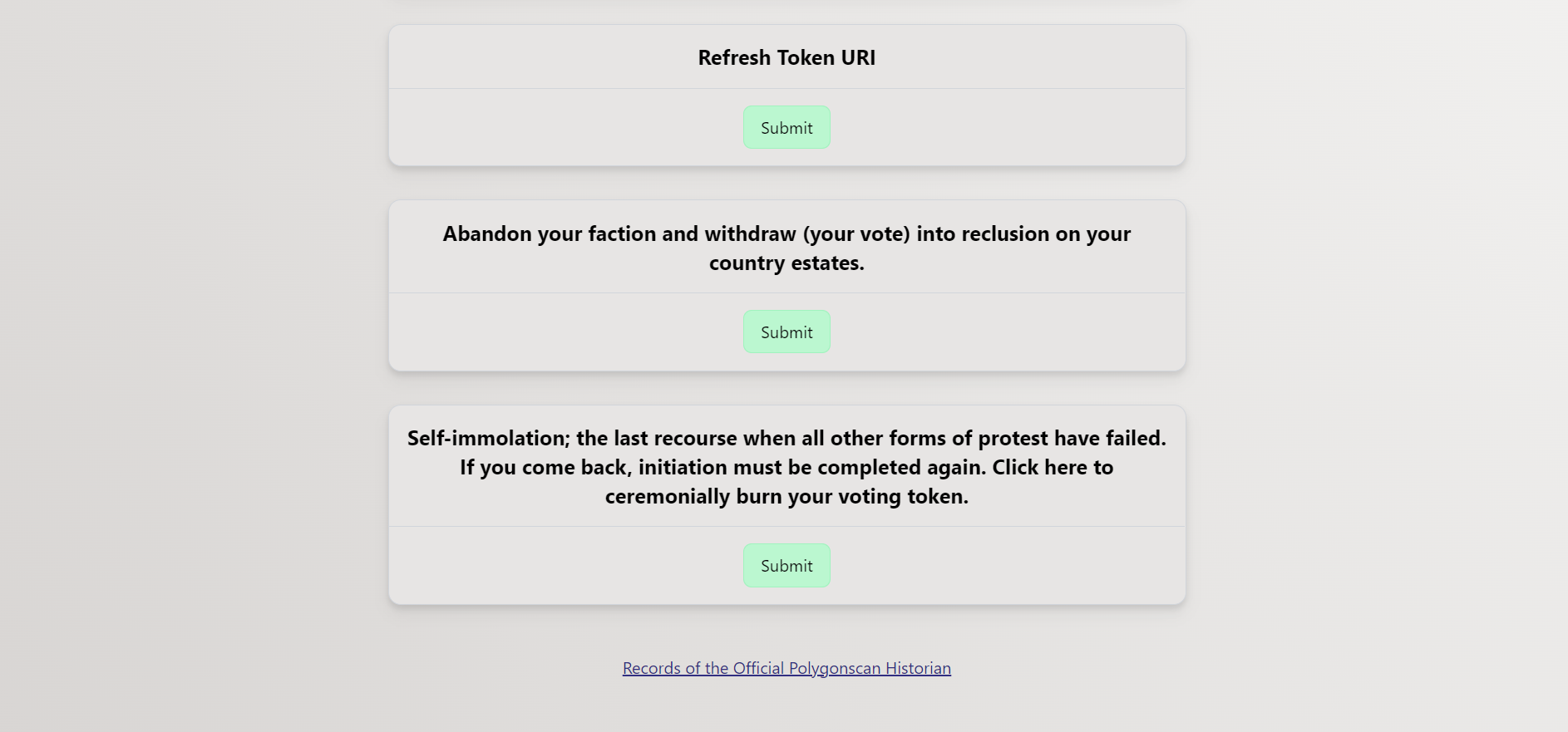
If a player succeeds in building the biggest faction, they gain the Chancellor's seal NFT.

This grants them the right to claim their $DB 1000 daily salary, as well as to mint new coins.
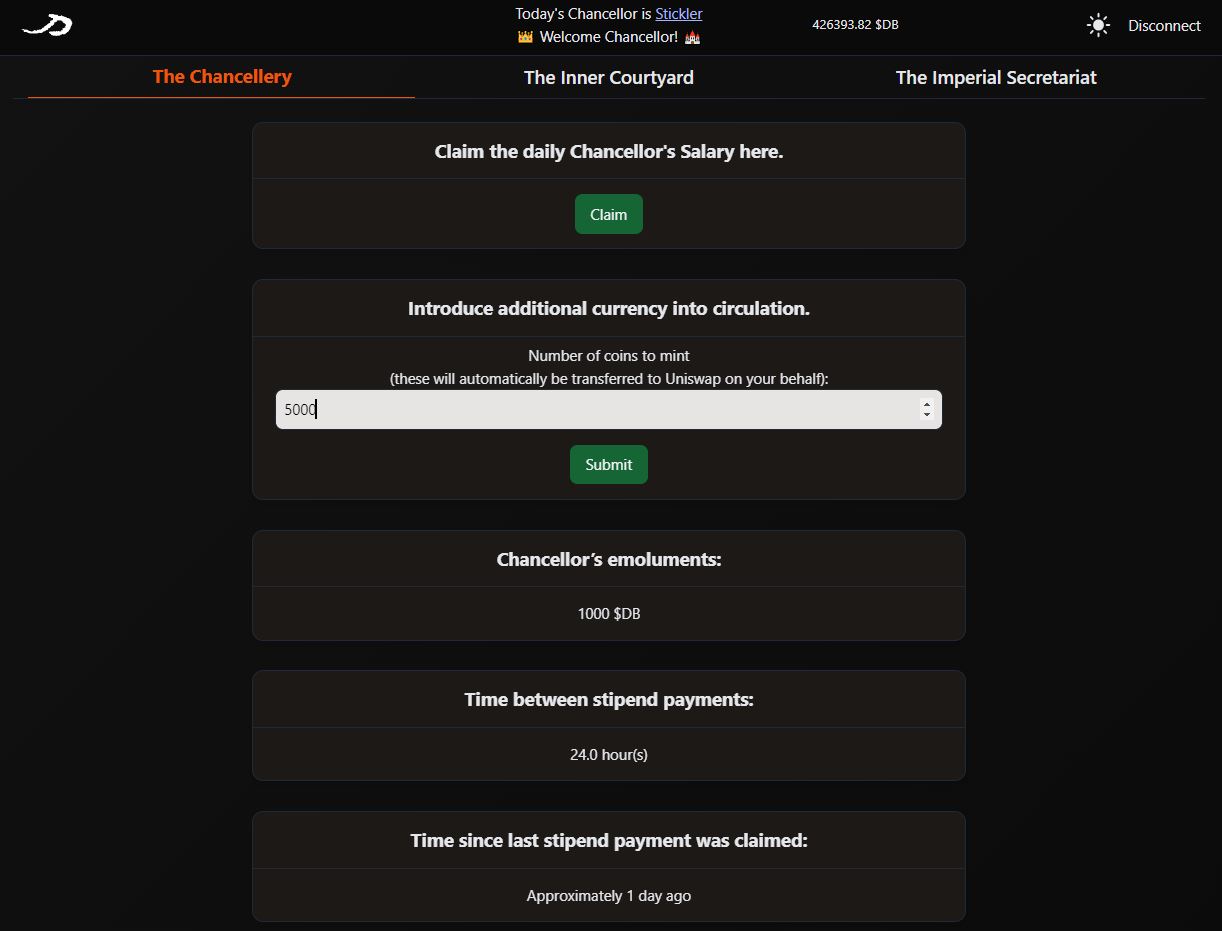
Possible Issues/Bugs
There is, obviously, one major security flaw in this proposal. Namely, the likelihood that participants will create fake followers in order to gain permanent control over the network. To minimise this risk, it is proposed that only individuals who: a) possess a wallet containing a quantity of DAObi and b) have linked this wallet to a functional Twitter account will be permitted to become or acquire partisans. In the longer term additional safeguards will be implemented to prevent sybil attacks. Notably we intend to implement a fourth contract that will allow players to nominate others who have not been active for a certain amount of time to have their voting token burnt. Genuine participants can simply mint a new token if this happens to them.
The initial aim should be to get enough participants involved early to create an active ecosystem and give a certain level of real-world value to the tokens created, while avoiding the attention of pure speculators. We have already primed the pump by airdropping an initial batch of tokens to followers of the @XianyangCB and @DaobiTreasury Twitter accounts who expressed an early interest, as well as members of the Discord server. We also gave additional tokens to those who have participated in the development and testing process. Initially voters received payment for each vote cast and the Chancellor received a daily salary. As participation stabilised we withdrew the voter salary aspect, with this being replaced with incentives paid directly by chancellors and aspiring chancellors. The Chancellor’s salary remained (and will remain) in place, however.
We also recognise that the outsourcing of security to Twitter is not a feasible solution to the throwaway account problem in the context of a large-scale, high-value currency. In that case alternative proof-of-human mechanisms will need to be developed.